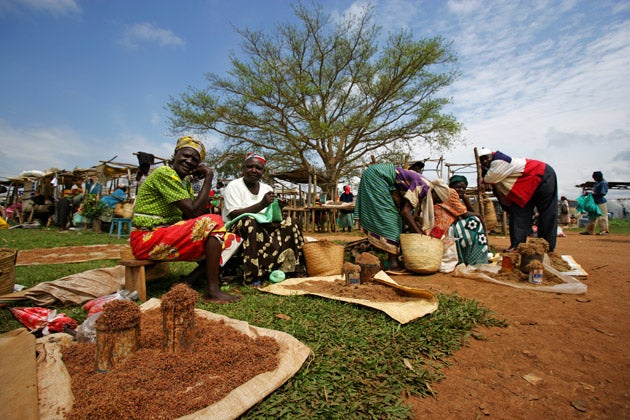On The Road: The East African market where the brands come cheap

I am trying to decide between a Gap shirt and a Guess top. My partner has a carrier bag containing a pair of Adidas trainers and a Versace tie. We're not in a Dubai shopping mall or a Manhattan department store. We're shopping at an open market in Kisumu, a dusty little backwater on the shores of Lake Victoria in Kenya.
The clothes are genuine labels, not knock-offs imported from China, and we are buying mitumba, now seen in all the open markets throughout Kenya and beyond. They are second-hand clothes imported from better-off countries, and I've paid a little less than 80p for my Guess top.
Mitumba is a Kiswahili word meaning bale or bundle, and the second-hand clothes are called mitumba because they arrive and are sold to retailers in tightly packed bales. They are brought to East Africa by a number of importers who mostly get their stock from charity shops or buy end-of-line stock from the clothing manufacturers in the West and Asia. Each mitumba trader sells his or her bale from a rented stall where buyers rummage through the garments.
Mitumba not only provides an affordable source of clothing for the poor in Africa, but jobs too, although there is some controversy that the trade is putting the future of local textile industries under threat. In East Africa, an estimated three to four million people are involved in the business as importers, transport providers, wholesalers and market traders. It's now so popular that the Kenyan and Tanzania governments charge VAT on the clothes as well as a hefty import duty.
Back in Kisumu I wander around the market, which is made up of a long line of shacks roofed with plastic bags and lined with mud and sticks. Traders offer skirts and blouses from Esprit and Jigsaw, Ralph Lauren shirts and Diesel jeans are slung over wooden poles, and Nike trainers hang in strings like onions.
I decide to get the Gap shirt as well as the Guess top, for the equivalent of about £1. In fact, there are so many Gap items for sale in all of the mitumba markets, they should seriously consider running an advertising campaign here.
Footprint's Kenya Handbook is available now (£14.99).
Join our commenting forum
Join thought-provoking conversations, follow other Independent readers and see their replies
Comments
Bookmark popover
Removed from bookmarks